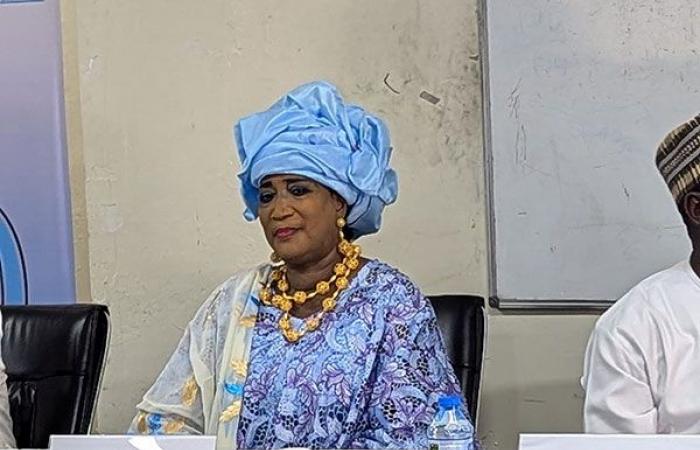These are no longer just songs. The university makes Kiné Lam, his texts, his music speak differently. It makes them speak, through a tribute, in terms of lectures.
By Moussa Seck – A girl in the audience. Who surely knows how to sing. But, that her mentor intends to entrust to someone more experienced. A certain Serigne Saliou, hoping that the latter can help the budding singer overcome stage fright. Beyond this Serigne, she has someone to draw inspiration from. She is in the front row, facing the lady in blue, made up but not too much, with yellow finery. Cameras and cameras trained on her. More light, greetings, whispers: she is someone. She is a voice. A physiotherapist who has healed more than one with her songs. A Lam who has never decided to hurt. Physiotherapist Lam, a traditional-modern bridge, we were waiting. She is there, in the Kocc Barma Fall amphitheater of the Faculty of Science and Technology of Education and Training (Fastef). Because the lady’s repertoire is so rich that it invites her to do so, the Research Group on Contemporary Cultural Expressions (Gre2c) has proposed to look into it. The pedagogy of good and the didactics of beauty will thus be tracked in the singer’s repertoire. And because Kiné Lam is not just a singer: she is Fastef. She is, in the sense that the said faculty “has put the question of education at the heart of its concerns”, and in the sense that “this fight that we are also carrying is the fight of the diva”. Words of the dean, Moustapha Sokhna.
Kiné, the soul of cultural mediation
These are therefore doctors in their field who speak of the one who has seen her name, since its beginnings, linked to that of Mame Bamba. Doctors, among whom is Kalidou Sy from the Gaston Berger University of Saint-Louis. For him, music “is a moment of pleasure, but it is also a moment during which society faces itself and gives itself the means to regenerate itself”. But it would still be necessary to have a hand that holds out to this society the mirror in which it will see itself. The voice of Kiné Lam is one of these hands, one of these mirrors. Of this music “arched to Senegalese society”, it will be cited, alongside Yandé Codou Sène, as a symbol by the Sanarois. And, “this is why most of their creations are almost a kind of remix of what we hear in homes, the streets, in social groups”. Music that rocks on the one hand: recreation, says Kalidou. Music that reflects society and calls it to regeneration on the other hand: re-creation, says Ly.
Kiné Lam Mame Bamba does not only make texts and music in the understanding of the teachers who honor her. She, her texts, her music weave bridges between the court of kings and the forecourt of daaras. She, her voice and her songs have the value of a sound archive because she allows history to be exhumed. We talked in the amphitheater about a state project for a national library. An academic stressed the importance of taking into account talking books, in addition to silent ones. The diva was there between the two projects, history book that she is, and to anticipate in case we wondered about the feasibility. She was there, representing her world, within the university world, in case, again, we doubted the possibility of collapsing the dams. Kiné then, the soul of cultural mediation…
Kiné, the soul of maam
Marriage is a time conducive to poetic creation, Mr. Ibrahima Faye of the Fundamental Institute of Black Africa (Ifan) stressed in his speech. In the repertoire of the popular poet studied by the University, this theme occupies an important place. For I. Faye, Kiné Lam is assimilated to a receptacle of what the society in which she evolves has as a conception, with regard to marriage. So she has not only received and digested this legacy: she is a transmission belt. Kiné Lam and her texts are thus, according to Mr. Faye, part of a dynamic of construction of the imagination. “Sëy xare la”, the lady’s flagship text on this point, will be dissected on site to report on what the singer has reported on what she has received. What she has transmitted. But, “without failing to express his regrets” concerning “the changes operating in the matrimonial system”, and addressing these new generations evolving in an era of cultural export. Regrets, certainly! But Kiné has never ceased to bring to the ills the remedy of words. Mr. Alioune Badara Guèye, on this point: “With his songs, Kiné Lam heals the wounds of a society which is going through at best an identity crisis, at worst, a crisis of values where the notions of respect, humility and love tend to disappear in favor of an unhealthy competition and a lack of respect and commitment, particularly in interpersonal relationships and behaviors.” Cf, nimay doxee.
Kiné, the soul in continual mediation
Dogo the man, Dogo the title. Dogo, we inevitably think of him, when we evoke marriage and interpersonal relationships in Kiné Lam’s repertoire. The man was for his lady a support, a friend, a husband. Tribute will be paid to him already during his lifetime via this title. A title? A hymn to love!, Alioune Badara Guèye will say. A hymn sung but better, practiced. To evoke Dogo then is to provoke a young smile on the aging face of his widow. We will also see nostalgia cross her face, when she herself hears herself, via muted music that fills the amphitheater, evoking Cheikh Tidiane Tall. And we will see her cry while talking about her mother. Kiné then, the soul in continual mediation.






